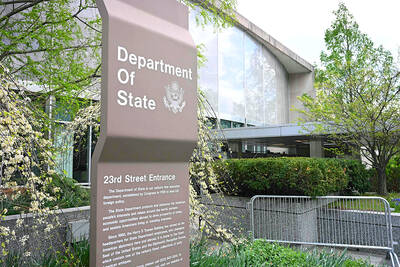Washington’s need to defend Taiwan from a Chinese attack is greater today than it was 30 years ago, a leading US military strategist said on Tuesday.
“Taiwan is everything we preach about — it is what we want other countries to be,” said Thomas McNaugher, director of studies at Georgetown University’s Center for Security Studies.
Invading Taiwan would be an “extremely dicey” operation, McNaugher told an Atlantic Council discussion titled “Conflict in the Taiwan Strait?”
Amphibious assaults are very tough and China does not have any particular experience in that area, he said.
Rather than a direct attack, Beijing might try a blockade if it decided to force unification, he said.
However, a blockade would take a lot of time to enforce and that would allow US power to build up “pretty effectively,” he said.
McNaugher said that China’s military buildup has been very effective and comprehensive, and Beijing was continuing to make “steady, relentless progress.”
He said the US still had an edge in the conventional balance of power, but that “we have entered that fuzzy area where there is a lot of uncertainty about how this would go.”
In case of an attack, US intervention would depend on how the hostilities started, McNaugher said.
“Taiwan is a raucous democracy; they even have fist fights in the legislature. It has a great economy with great human rights,” he said. “If we were to let Taiwan go to a rapacious and naked Chinese attack, not only would it destroy the global economy, it would undermine our credibility.”
On the other hand, if a war started because Taiwan “promotes it,” there would be a real question about US support, he said.
The message to the Taiwanese was that in case of a conflict with China they had to be the victims and not the promoters, he said.
One way for Taiwan to avoid an attack would be for it to “very visibly” build up its ability to defend itself and increase the level of deterrence, he said.
In related news, Walter Lohman, director of the Asian Studies Center at the Washington-based Heritage Foundation, said in a new paper that the US should clarify its support for Taiwan.
As “carefully and responsibly” as president-elect Tsai Ing-wen (蔡英文) and the Democratic Progressive Party (DPP) might approach relations with China, they nevertheless fundamentally rejected Beijing’s dream of ultimate unification, and this would remain an underlying source of tension as long as the DPP remains in power, he wrote.
US President Barack Obama’s administration should establish “unwavering support” for Taiwan’s security and prerogative in determining its own future, Lohman said.
“To this end, the administration should facilitate new arms sales, or, failing this, at least begin building interagency consensus and support on Capitol Hill and Taipei to facilitate approval early in 2017,” he wrote.
“New fighter jets and diesel-electric submarines should be at the top of the list,” he added.

Hong Kong singer Eason Chan’s (陳奕迅) concerts in Kaohsiung this weekend have been postponed after he was diagnosed with Covid-19 this morning, the organizer said today. Chan’s “FEAR and DREAMS” concert which was scheduled to be held in the coming three days at the Kaohsiung Arena would be rescheduled to May 29, 30 and 31, while the three shows scheduled over the next weekend, from May 23 to 25, would be held as usual, Universal Music said in a statement. Ticket holders can apply for a full refund or attend the postponed concerts with the same seating, the organizer said. Refund arrangements would

Former president Tsai Ing-wen (蔡英文) on Monday called for greater cooperation between Taiwan, Lithuania and the EU to counter threats to information security, including attacks on undersea cables and other critical infrastructure. In a speech at Vilnius University in the Lithuanian capital, Tsai highlighted recent incidents in which vital undersea cables — essential for cross-border data transmission — were severed in the Taiwan Strait and the Baltic Sea over the past year. Taiwanese authorities suspect Chinese sabotage in the incidents near Taiwan’s waters, while EU leaders have said Russia is the likely culprit behind similar breaches in the Baltic. “Taiwan and our European

Taiwanese indie band Sunset Rollercoaster and South Korean outfit Hyukoh collectively received the most nominations at this year’s Golden Melody Awards, earning a total of seven nods from the jury on Wednesday. The bands collaborated on their 2024 album AAA, which received nominations for best band, best album producer, best album design and best vocal album recording. “Young Man,” a single from the album, earned nominations for song of the year and best music video, while another track, “Antenna,” also received a best music video nomination. Late Hong Kong-American singer Khalil Fong (方大同) was named the jury award winner for his 2024 album

The US Department of State on Monday reaffirmed that US policy on Taiwan remains unchanged, following US President Donald Trump’s use of the term “unification” while commenting on recent trade talks with China. Speaking at a wide-ranging press conference, Trump described what he viewed as progress in trade negotiations with China held in Geneva, Switzerland, over the weekend. “They’ve agreed to open China — fully open China, and I think it’s going to be fantastic for China. I think it’s going to be fantastic for us,” Trump said. “I think it’s going to be great for unification and peace.” Trump’s use of the